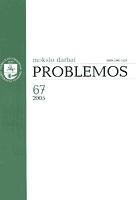F. NIETZSCHE IR G. DELEUZE: SĖSLUMO SIMPTOMATIKA IR NOMADIŠKO MĄSTYMO AKISTATOS
F. NIETZSCHE AND G. DELEUZE: THE SEDENTARY LIFE SYMPTOMATICS AND NOMADIC THINKING CONFRONTATIONS
Author(s): Arūnas MickevičiusSubject(s): Philosophy
Published by: Vilniaus Universiteto Leidykla
Keywords: will to power; interpretation; symptomatics; sedentary life; nomadism; encounter model; recognition model
Summary/Abstract: The article deals with F. Nietzsche’s and G. Deleuze’s attitude to classical thought. Nietzsche’s theoretical constructs are based on the principle Wille zur Macht, where he emphatically praised active forces and accused all classical thinking of turning away from life and associating it with reactive, negative forces. Nietzsche’s philosophy denies the exceptionally unique true opinion of the world and offers, instead, a variety of interpretations, i. e. a perspectivist approach to the world. In describing architectural metaphors of classical thinking he shows that it is reactive, life-denying, that its assumed grandeur in fact hides the poverty of life. On the other hand, Nietzsche attempts to release the metaphoric power from the single axiom of Truth, to release creativity, to legitimize a perspective, interpretative view of the world, based on the mentioned “will-to-power” principle and related to assertive powers of active life. Also, there are analyzed two models of knowledge, recognition and encounter, proposed by G. Deleuze. The main aims of the article is to demonstrate first, that Nietzsche’s philosophy can be named as nomadic thinking which corresponds to the model of encounter and, second, reveal the transcendental conditions of innovation.
Journal: Problemos
- Issue Year: 2006
- Issue No: 69
- Page Range: 62-83
- Page Count: 22
- Language: Lithuanian

